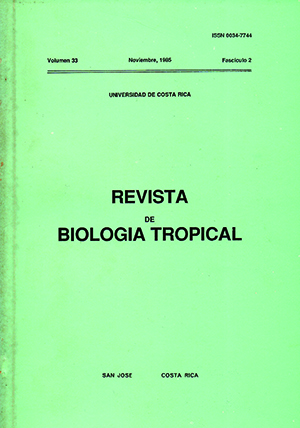Abstract
Under laboratory conditions, the fish Priapichthys annectens can consume 40-85 culicine larvae in 1.3-2.4 min. Fecal examination of 37 recently captured fishes contained remains of dipterans, coleopterans, hymenopterans, ephemeropterans, hemipterans and acarines. 51.4% had remains of arthropods, and 13.5% of culicine larvae. This neotropical species might be of value in the biological control of culicine mosquitoes.References
Bussing, W.A. 1966. New Species and New Records of Costa Rican Freshwater Fishes with a tentative list of Species. Rev. Biol. Trop., 14: 205-249.
Gerberich, J.B., & M. Laird. 1968. (eds.). Bibliography of papers relating to the control of mosquitoes by the use of fish. An annotated bibliography for the years 1901-1966. FAO. Fisheries Technical Paper No. 75. Roma.
National Academy of Sciences. 1973. Mosquito control. Some Perspectives for Developing Countries. Washington, D.C.
Rosen, D.F., & R.M. Bailey, 1963. The poeciliid fishes (Cyprinodontiformes), their structure, Zoogeography and systematics. Bull. Amer. Mus. Nat. Hist., 126: 116-126.
UNDP/WORLD BANK/WHO. 1981. Special programme for research and training in tropical diseases. TDR/BCV /ICMC/ 81.3 WHO/VBC/82.838. Informal Consultation on the use of fish for mosquito control. Ginebra.
Ungureanu, E., J. H. Pull, & R. Pal. 1981. Detailed study design for field studies regarding the evaluation of the efficacy of larvivorous fish for the control of malaria WHO/MAL/81.974. WHO/VBC/81.816.
WHO TDR/BCV-SWG (3) 79.3. 1979. Third meeting of the scientific working group on biological control of insect vectors of diseases. Ginebra.
##plugins.facebook.comentarios##

This work is licensed under a Creative Commons Attribution 4.0 International License.
Copyright (c) 1985 Revista de Biología Tropical


